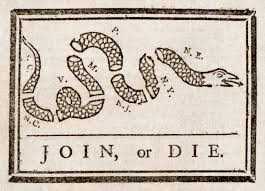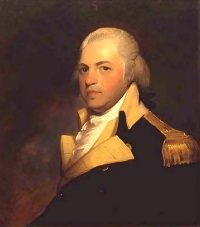Scavenging
According to Montresor, "The advanced part of the army took a considerable quantity of tobacco, Indian corn, and other articles." These articles would have included pitch, tar, and cordage necessary for ship maintenance. Anything that could be used, sold, or traded was taken. The British also helped themselves to the 7,000 bushels of corn that Washington had expressly wished not to fall into their hands (see right). Some of the corn was eaten immediately and the rest was transported on a board torn from a warehouse. This excess corn was buried in a ditch for future use.
Washington and the Public Supplies
In the days leading up to the British landing, the "quantity of public and private stores at the Head of Elk ... among others a considerable parcel of salt" had been of grave concern to Washington. By the 27th he was able to report to Congress that all had been saved, except for the corn. "All the public Stores are removed from thence, except about seven Thousand Bushels of corn. This I urged the commissary there to get off as soon as possible..."
Stealing Sheep and Ransacking Houses
Hanging was the punishment Howe ordered for those caught plundering or stealing. Despite the threat of harsh punishment, his troops generally went on stealing cattle and sheep and ransacking houses. According to Major John Andre, some soldiers "were inclined to traffick for fresh provisions"; but more often than not, the horde of rogue marauders preferred to just take what they wanted regardless of whether their victims were Whigs, Loyalists, or apolitical.
Empty houses in particular proved irresistible temptation. Shortly after the fleet landed, two Hessians were hung and five were publicly whipped "within an inch of their lives" after being caught stealing from abandoned farmsteads. Howe was incapable of controlling his horde of hungry, avaricious soldiers.
And Some Got Caught
Some unlucky British plunderers blundered too far beyond the safety of their lines and were taken prisoner by the rebel militia. This luckless brood who had just spent over three months at sea, would now be in for a much longer confinement. American Light-Horse Harry Lee took charge of the POWs and packed them off to Wilmington where they would have to await a prisoner exchange.To Plunder Her of Her Rings
A British general wrote home the following:
A soldier of ours was yesterday taken by the enemy beyond our lines, who had chopped off an unfortunate woman's fingers in order to plunder her of her rings. I really think the return of this army to England is to be dreaded by the peacable inhabitants.




